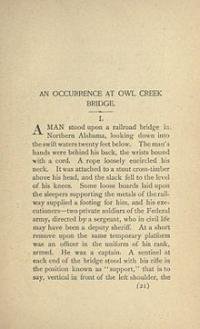Ambroz Birs - An Affair of Outposts
Here you can read online Ambroz Birs - An Affair of Outposts full text of the book (entire story) in english for free. Download pdf and epub, get meaning, cover and reviews about this ebook. genre: Prose. Description of the work, (preface) as well as reviews are available. Best literature library LitArk.com created for fans of good reading and offers a wide selection of genres:
Romance novel
Science fiction
Adventure
Detective
Science
History
Home and family
Prose
Art
Politics
Computer
Non-fiction
Religion
Business
Children
Humor
Choose a favorite category and find really read worthwhile books. Enjoy immersion in the world of imagination, feel the emotions of the characters or learn something new for yourself, make an fascinating discovery.

- Book:An Affair of Outposts
- Author:
- Genre:
- Rating:5 / 5
- Favourites:Add to favourites
- Your mark:
- 100
- 1
- 2
- 3
- 4
- 5
An Affair of Outposts: summary, description and annotation
We offer to read an annotation, description, summary or preface (depends on what the author of the book "An Affair of Outposts" wrote himself). If you haven't found the necessary information about the book — write in the comments, we will try to find it.
An Affair of Outposts — read online for free the complete book (whole text) full work
Below is the text of the book, divided by pages. System saving the place of the last page read, allows you to conveniently read the book "An Affair of Outposts" online for free, without having to search again every time where you left off. Put a bookmark, and you can go to the page where you finished reading at any time.
Font size:
Interval:
Bookmark:
An Affair of Outposts
by Ambrose Bierce
Chapter I
Two men sat in conversation. One was the Governor of the State. The year was 1861; the war was on and the Governor already famous for the intelligence and zeal with which he directed all the powers and resources of his State to the service of the Union.
What! you? the Governor was saying in evident surpriseyou too want a military commission? Really, the fifing and drumming must have effected a profound alteration in your convictions. In my character of recruiting sergeant I suppose I ought not to be fastidious, butthere was a touch of irony in his mannerwell, have you forgotten that an oath of allegiance is required?
I have altered neither my convictions nor my sympathies, said the other, tranquilly. While my sympathies are with the South, as you do me the honor to recollect, I have never doubted that the North was in the right. I am a Southerner in fact and in feeling, but it is my habit in matters of importance to act as I think, not as I feel.
The Governor was absently tapping his desk with a pencil; he did not immediately reply. After a while he said: I have heard that there are all kinds of men in the world, so I suppose there are some like that, and doubtless you think yourself one. Ive known you a long time andpardon meI dont think so.
Then I am to understand that my application is denied?
Unless you can remove my belief that your Southern sympathies are in some degree a disqualification, yes. I do not doubt your good faith, and I know you to be abundantly fitted by intelligence and special training for the duties of an officer. Your convictions, you say, favor the Union cause, but I prefer a man with his heart in it. The heart is what men fight with.
Look here, Governor, said the younger man, with a smile that had more light than warmth: I have something up my sleevea qualification which I had hoped it would not be necessary to mention. A great military authority has given a simple recipe for being a good soldier: Try always to get yourself killed. It is with that purpose that I wish to enter the service. I am not, perhaps, much of a patriot, but I wish to be dead.
The Governor looked at him rather sharply, then a little coldly. There is a simpler and franker way, he said.
In my family, sir, was the reply, we do not do thatno Armisted has ever done that.
A long silence ensued and neither man looked at the other. Presently the Governor lifted his eyes from the pencil, which had resumed its tapping, and said:
Who is she?
My wife.
The Governor tossed the pencil into the desk, rose and walked two or three times across the room. Then he turned to Armisted, who also had risen, looked at him more coldly than before and said: But the manwould it not be better that hecould not the country spare him better than it can spare you? Or are the Armisteds opposed to the unwritten law?
The Armisteds, apparently, could feel an insult: the face of the younger man flushed, then paled, but he subdued himself to the service of his purpose.
The mans identity is unknown to me, he said, calmly enough.
Pardon me, said the Governor, with even less of visible contrition than commonly underlies those words. After a moments reflection he added: I shall send you to-morrow a captains commission in the Tenth Infantry, now at Nashville, Tennessee. Good night.
Good night, sir. I thank you.
Left alone, the Governor remained for a time motionless, leaning against his desk. Presently he shrugged his shoulders as if throwing off a burden. This is a bad business, he said.
Seating himself at a reading-table before the fire, he took up the book nearest his hand, absently opening it. His eyes fell upon this sentence:
When God made it necessary for an unfaithful wife to lie about her husband in justification of her own sins He had the tenderness to endow men with the folly to believe her.
He looked at the title of the book; it was, His Excellency the Fool.
He flung the volume into the fire.
Chapter II
How to Say What is Worth Hearing
The enemy, defeated in two days of battle at Pittsburg Landing, had sullenly retired to Corinth, whence he had come. For manifest incompetence Grant, whose beaten army had been saved from destruction and capture by Buells soldierly activity and skill, had been relieved of his command, which neverthless had not been given to Buell, but to Halleck, a man of unproved powers, a theorist, sluggish, irresolute. Foot by foot his troops, always deployed in line-of-battle to resist the enemys bickering skirmishers, always entrenching against the columns that never came, advanced across the thirty miles of forest and swamp toward an antagonist prepared to vanish at contact, like a ghost at cock-crow. It was a campaign of excursions and alarums, of reconnoissances and counter-marches, of cross-purposes and countermanded orders. For weeks the solemn farce held attention, luring distinguished civilians from fields of political ambition to see what they safely could of the horrors of war. Among these was our friend the Governor. At the headquarters of the army and in the camps of the troops from his State he was a familiar figure, attended by the several members of his personal staff, showily horsed, faultlessly betailored and bravely silk-hatted. Things of charm they were, rich in suggestions of peaceful lands beyond a sea of strife. The bedraggled soldier looked up from his trench as they passed, leaned upon his spade and audibly damned them to signify his sense of their ornamental irrelevance to the austerities of his trade.
I think, Governor, said General Masterson one day, going into informal session atop of his horse and throwing one leg across the pommel of his saddle, his favorite postureI think I would not ride any farther in that direction if I were you. Weve nothing out there but a line of skirmishers. That, I presume, is why I was directed to put these siege guns here: if the skirmishers are driven in the enemy will die of dejection at being unable to haul them awaytheyre a trifle heavy.
There is reason to fear that the unstrained quality of this military humor dropped not as the gentle rain from heaven upon the place beneath the civilians silk hat. Anyhow he abated none of his dignity in recognition.
I understand, he said, gravely, that some of my men are out therea company of the Tenth, commanded by Captain Armisted. I should like to meet him if you do not mind.
He is worth meeting. But theres a bad bit of jungle out there, and I should advise that you leave your horse andwith a look at the Governors retinueyour other impedimenta.
The Governor went forward alone and on foot. In a half-hour he had pushed through a tangled undergrowth covering a boggy soil and entered upon firm and more open ground. Here he found a half-company of infantry lounging behind a line of stacked rifles. The men wore their accoutrementstheir belts, cartridge-boxes, haversacks and canteens. Some lying at full length on the dry leaves were fast asleep: others in small groups gossiped idly of this and that; a few played at cards; none was far from the line of stacked arms. To the civilians eye the scene was one of carelessness, confusion, indifference; a soldier would have observed expectancy and readiness.
At a little distance apart an officer in fatigue uniform, armed, sat on a fallen tree noting the approach of the visitor, to whom a sergeant, rising from one of the groups, now came forward.
I wish to see Captain Armisted, said the Governor.
The sergeant eyed him narrowly, saying nothing, pointed to the officer, and taking a rifle from one of the stacks, accompanied him.
This man wants to see you, sir, said the sergeant, saluting. The officer rose.
Font size:
Interval:
Bookmark:
Similar books «An Affair of Outposts»
Look at similar books to An Affair of Outposts. We have selected literature similar in name and meaning in the hope of providing readers with more options to find new, interesting, not yet read works.
Discussion, reviews of the book An Affair of Outposts and just readers' own opinions. Leave your comments, write what you think about the work, its meaning or the main characters. Specify what exactly you liked and what you didn't like, and why you think so.


